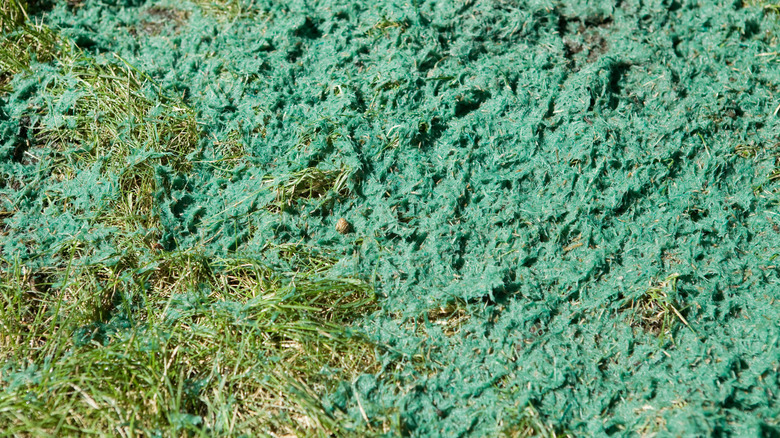YouTube
One of the most effective methods for planting grass across large areas is to hydroseed. This process applies a solution of water, fertilizer, and grass seed onto the surface of properly tilled soil. It’s often done with equipment to spray larger areas at one time, but smaller application options exist. Once applied, you typically can sit back and wait for your lush green grass to grow. However, when you do see your lawn begin to come in, don’t be too quick to haul out the lawnmower. It’s best to wait several weeks to a month before mowing a newly hydroseeded lawn.
If you mow your new grass too soon, you may limit its ability to grow and flourish. Consider that, to grow, grass uses not just the nutrients in the soil and water but also the sun’s rays through the photosynthesis process. In those first few weeks, those small blades of grass are pulling in the sun’s UV rays to turn them into energy. That energy then works to build out the root system; create strong, healthy blades of grass; and help fill in open areas. If you cut the grass too soon, you’re removing some of that valuable plant surface that these young blades need to grow healthy, right at a critical time.
Watch your grass grow before mowing it

One of the fascinating things about hydroseeding is just how effective it can be at helping to establish a strong, healthy lawn in just about no time. Hydroseeding is undoubtedly easier than worrying about grass seeds, birds eating the seeds, and hay covering your yard. However, it still takes some time. A good application of hydroseeding will likely allow grass to start sprouting within a week to 10 days. These small shoots of grass may come in uneven at first and may not fill out the soil just yet. However, over the coming weeks, you’ll notice more seeds taking root and growing to fill out the area.
Allow the grass to grow with proper watering and care over the next month. Try to limit the amount of walking and use of that space to give the grass as much support as possible as it comes in. The ideal time to mow a lawn after hydroseeding is dependent on the actual length of the blades rather than a given timeline. Wait until the average blade length is about 3 to 4 inches high. Once it reaches that level, you can mow with confidence that you won’t be damaging the lawn itself.
Don’t wait until the grass is much higher than this, though. Cutting it at this level helps stimulate the grass to continue to grow, and that can help with root establishment and overall filling in of open spaces.
Keep these tips in mind before cutting a hydroseeded lawn
Now that your grass is finally coming in, take the time to ensure the first mow goes well from start to finish. First, ensure the lawnmower’s blades are sharp. A good plan is to sharpen your blades annually. If they’re dull, some of the grass blades will bend instead of cut, and that creates damage to them and limits growth. A sharp blade cuts quickly and efficiently.
Next, adjust the height of the lawnmower. As a first cut (and for most other cuts), it’s best not to take off more than about ⅓ of the grass blade. This is essential in areas where you’re just establishing the lawn, as the plant needs the surface of the blade to continue to produce energy. By removing just this top portion, you’ll stimulate the healthy, fast-growing blades to keep going without damaging the shorter, newer blades just trying to come in.
You don’t have to remove lawn clippings from the grass. It’s one of the best ways to ensure proper nitrogen balance in the soil going forward. Typically, you won’t need to fertilize a freshly hydroseeded lawn right away, but consider adding fertilizer to the grass about a month after you’ve planted it, which is just about around the same time you’ll likely be mowing it. Ensure there are a few days between grass cutting and fertilizer application to limit the stress on the blades.